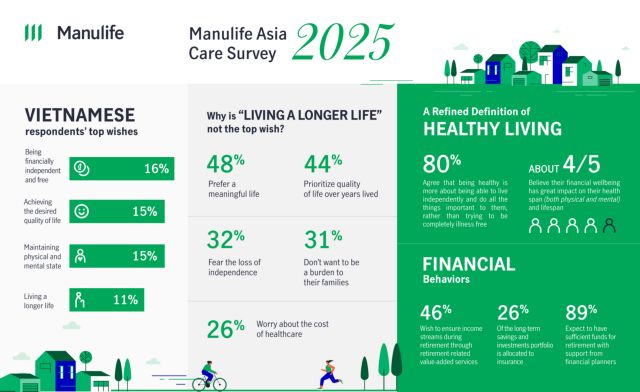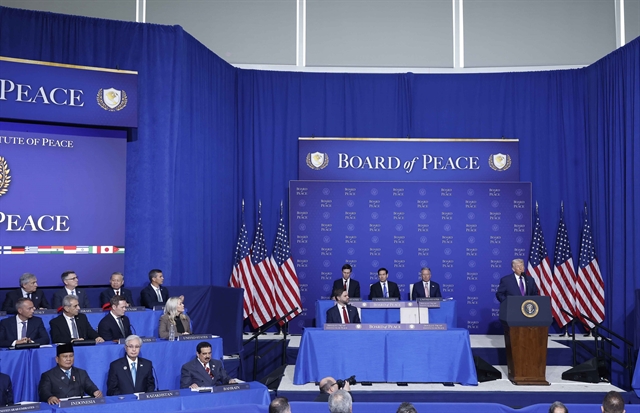 Economy
Economy
.jpg)
 |
| Notable figures in the Manulife Asia Care 2025 survey results.— Photos courtesy of Manulife |
HCM CITY — Manulife has officially released its Manulife Asia Care 2025 survey, offering insights into consumer perspectives on health, finance, and retirement across the region.
In Việt Nam, the survey gathered responses from 1,000 individuals representing a broad range of ages and professions. The findings reveal a noteworthy trend: Vietnamese people now prioritise 'adding life to years' over 'adding years to life'.
Quality of life, financial independence and health take priority over longevity
According to the United Nations, the average life expectancy in Việt Nam is expected to rise from 74.6 years in 2023 to 78.9 years by 2050. However, findings from the Manulife Asia Care survey suggest that living longer is no longer the foremost aspiration among Vietnamese people.
While respondents estimate the national average life expectancy will reach around 80 years, those who prioritise quality of life over longevity express a personal preference to live only until age 76, four years below the projected national average.
The Manulife Asia Care 2025 survey reveals that only 11 per cent of Vietnamese respondents consider living a longer life their top aspiration. In contrast, 16 per cent prioritise achieving financial independence, 15 per cent value quality of life, and another 15 per cent focus on maintaining both physical and mental health. Notably, nearly one in four respondents aged 25 to 34 select total financial independence as their primary goal.
When asked why “living longer” is no longer a top priority, 48 per cent of Vietnamese respondents said they aspire to live a meaningful life, while 44 per cent emphasised the importance of quality of life. Additionally, 32 per cent fear losing their independence, 31 per cent do not want to become a burden on their families, and 26 per cent are worried about the potential financial strain and rising healthcare costs in later years. These findings underscore a significant shift in how Vietnamese people view longevity, favouring a healthy, purposeful life with financial independence over simply extending their years.
 |
| The Manulife Asia Care 2025 survey was conducted with 1,000 Vietnamese people of diverse ages and professions. |
Health is wealth, or vice versa?
The survey highlights a significant shift in how Vietnamese consumers define health. Rather than focusing solely on the absence of illness, a vast majority now associate health with the ability to live independently and enjoy life. Specifically, 80 per cent of respondents agreed with the statement: “Being healthy is more about being able to live independently and do all the things important to me, more than trying to be completely illness free.”
It also reveals that physical health (40 per cent), mental health (32 per cent), and financial health (28 per cent) are the top factors influencing desired life expectancy among Vietnamese respondents. Importantly, financial health is seen as a major driver of the others: 83 per cent say it affects how long they can maintain mental health, 81 per cent link it to physical health, and 79 per cent believe it influences overall lifespan. Remarkably, 88 per cent of participants consider financial wellbeing to have a greater impact on mental health than other factors such as family relationships (86 per cent), sense of purpose (86 per cent) or social connections (80 per cent).
At the same time, the survey highlights strong awareness among Vietnamese consumers about the importance of financial preparation for retirement. Traditional forms like cash savings (46 per cent), fixed deposits, pension programs, and real estate remain top priorities. However, there is a growing interest in long-term investment options, with insurance leading at 26 per cent, followed by stocks (11 per cent), investment funds (9 per cent) and bonds (7 per cent).
Tina Nguyễn, CEO of Manulife Vietnam, said this year’s Manulife Asia Care survey reveals an interesting new trend in how the people of Việt Nam perceive life.
She said: "By prioritising healthy living, quality of life, and financial independence over living a longer life, Vietnamese are becoming more proactive and attentive about caring for their physical health, mental well-being, and financial security.
"This presents a valuable opportunity for the insurance industry, including Manulife Vietnam, to strive and innovate further in meeting the needs of health care and financial planning for the community.” — VNS
.jpg)



